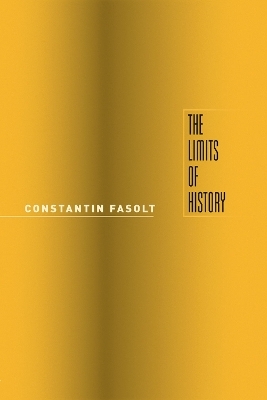
The Limits of History
Seiten
2013
University of Chicago Press (Verlag)
978-0-226-10124-8 (ISBN)
University of Chicago Press (Verlag)
978-0-226-10124-8 (ISBN)
History casts a spell on our minds more powerful than science or religion. This title considers the work of Hermann Conring (1606-81) and Bartolus of Sassoferrato (1313/1457), two antipodes in early modern battles over the principles of European thought and action that ended with the triumph of historical consciousness.
History casts a spell on our minds more powerful than science or religion. It does not root us in the past at all, but instead flatters us with the belief in our ability to recreate the world in our image. It is a form of self-assertion that brooks no opposition or dissent and shelters us from the experience of time. So argues Constantin Fasolt in The Limits of History, an ambitious and path-breaking study that conquers history's power by carrying the fight into the center of its domain. Fasolt considers the work of Hermann Conring (1606-81) and Bartolus of Sassoferrato (1313/1457), two antipodes in early modern battles over the principles of European thought and action that ended with the triumph of historical consciousness. Proceeding according to the rules of normal historical analysis-gathering evidence, putting it in context, and analyzing its meaning - Fasolt uncovers limits that no kind of history can cross. He concludes that history is a ritual designed to maintain the modern faith in the autonomy of states and individuals. God wants it - the old crusaders would have said. The truth, Fasolt insists, only begins where that illusion ends.
With its probing look at the ideological underpinnings of historical practice, The Limits of History demonstrates that history presupposes highly political assumptions about free will, responsibility, and the relationship between the past and the present.
History casts a spell on our minds more powerful than science or religion. It does not root us in the past at all, but instead flatters us with the belief in our ability to recreate the world in our image. It is a form of self-assertion that brooks no opposition or dissent and shelters us from the experience of time. So argues Constantin Fasolt in The Limits of History, an ambitious and path-breaking study that conquers history's power by carrying the fight into the center of its domain. Fasolt considers the work of Hermann Conring (1606-81) and Bartolus of Sassoferrato (1313/1457), two antipodes in early modern battles over the principles of European thought and action that ended with the triumph of historical consciousness. Proceeding according to the rules of normal historical analysis-gathering evidence, putting it in context, and analyzing its meaning - Fasolt uncovers limits that no kind of history can cross. He concludes that history is a ritual designed to maintain the modern faith in the autonomy of states and individuals. God wants it - the old crusaders would have said. The truth, Fasolt insists, only begins where that illusion ends.
With its probing look at the ideological underpinnings of historical practice, The Limits of History demonstrates that history presupposes highly political assumptions about free will, responsibility, and the relationship between the past and the present.
Constantin Fasolt is professor of history at the University of Chicago. He is the author of Council and Hierarchy: The Political Thought of William Durant the Younger and the editor and translator of Hermann Conring's New Discourse on the Roman-German Emperor.
| Sprache | englisch |
|---|---|
| Maße | 17 x 22 mm |
| Gewicht | 539 g |
| Themenwelt | Geschichte ► Allgemeine Geschichte ► Vor- und Frühgeschichte |
| Geisteswissenschaften ► Geschichte ► Geschichtstheorie / Historik | |
| ISBN-10 | 0-226-10124-X / 022610124X |
| ISBN-13 | 978-0-226-10124-8 / 9780226101248 |
| Zustand | Neuware |
| Haben Sie eine Frage zum Produkt? |
Mehr entdecken
aus dem Bereich
aus dem Bereich
auf den Spuren der frühen Zivilisationen
Buch | Hardcover (2023)
C.H.Beck (Verlag)
20,00 €
Konzepte – Methoden – Theorien
Buch | Softcover (2024)
UTB (Verlag)
39,90 €
Was Pompeji über uns erzählt
Buch | Hardcover (2023)
Propyläen (Verlag)
32,00 €


